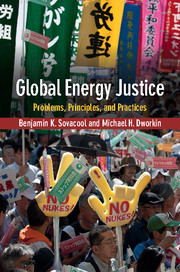Book contents
- Frontmatter
- Epigraph
- Dedication
- Contents
- Analytical table of contents
- List of figures
- List of tables
- Acknowledgements
- List of abbreviations
- 1 Introduction
- 2 The global energy system
- 3 Virtue and energy efficiency
- 4 Utility and energy externalities
- 5 Energy and human rights
- 6 Energy and due process
- 7 Energy poverty, access, and welfare
- 8 Energy subsidies and freedom
- 9 Energy resources and future generations
- 10 Fairness, responsibility, and climate change
- 11 The imperative of making just energy decisions
- Index
- References
11 - The imperative of making just energy decisions
Published online by Cambridge University Press: 05 October 2014
- Frontmatter
- Epigraph
- Dedication
- Contents
- Analytical table of contents
- List of figures
- List of tables
- Acknowledgements
- List of abbreviations
- 1 Introduction
- 2 The global energy system
- 3 Virtue and energy efficiency
- 4 Utility and energy externalities
- 5 Energy and human rights
- 6 Energy and due process
- 7 Energy poverty, access, and welfare
- 8 Energy subsidies and freedom
- 9 Energy resources and future generations
- 10 Fairness, responsibility, and climate change
- 11 The imperative of making just energy decisions
- Index
- References
Summary
Now we come to our closing chapter, in which we hope to summarize what we have learned about how justice theory can help us make energy decisions. As we do so, let us consider one more factual example, a clear and horrible test of life and death. With that example in mind, we will try to both recognize the diversity of advice that justice theorists might give and, moreover, find some core principles that they do seem to share.
On the evening of April 25, 1986, engineers at Chernobyl’s number four reactor in the Ukraine experimented with the cooling pump system to see if it could still function without auxiliary electricity supplies. In order to proceed with the test, the operators turned off the automatic shutdown system. At the same time, they mistakenly lowered too many control rods into the reactor core, dropping plant output too quickly. This stressed the fuel pellets, causing ruptures and explosions, bursting the reactor roof and sweeping the eruption outwards into the surrounding atmosphere. As air raced into the shattered reactor, it ignited flammable carbon monoxide gas and created a radioactive fire that firefighters could not extinguish.
- Type
- Chapter
- Information
- Global Energy JusticeProblems, Principles, and Practices, pp. 353 - 377Publisher: Cambridge University PressPrint publication year: 2014



